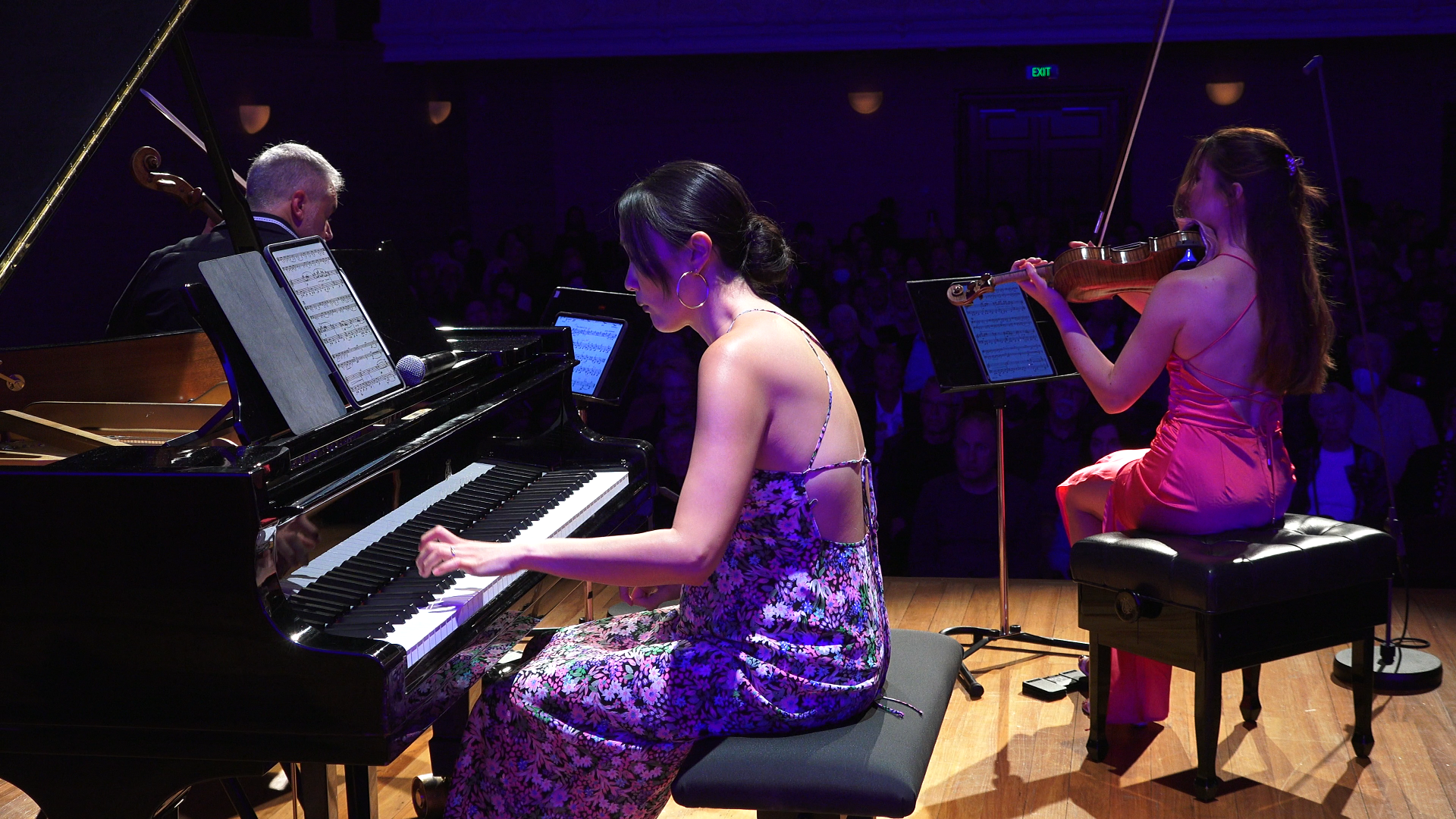NZTrio Composing Competition
15oct5:00 pm6:00 pmNZTrio Composing CompetitionWinners concert Wellington
Event Details
NZTrio is joined by guest violinist Miranda Adams in this exhibition of the winning works from our second ever Composing Competition, this time entitled Turning a Phrase. Tertiary composition students from
Event Details
NZTrio is joined by guest violinist Miranda Adams in this exhibition of the winning works from our second ever Composing Competition, this time entitled Turning a Phrase.
Tertiary composition students from Auckland, Waikato, NZSM Wellington, Canterbury and Otago universities submit works of under 10 minutes in duration, taking inspiration from New Zealand works of literature and poetry. NZTrio selects several works to advance to the workshop stage and travels around the country workshopping these pieces with their creators. Finally, NZTrio and composer Juliet Palmer together select the best works and these are performed in live public concert.
Come along to this free event to witness some of New Zealand’s best emerging talent.
General admission, no bookings required – early arrival advised.
Programme List:
Riley Cahill (UofA) – Territory of the Heart
Abby Pinkerton (Waikato) – Whispers and Echoes
Callum Mallett (NZSM) – Departure, at the going tide
Richard Francis (UofA) – Reflections
Rosa Elliott (UofCant’y) – Voices of the Air
Lily James (UofA) – Charcoal on White Snow
Marcus Jackson (NZSM) – when where (for piano trio and electronics)
Josiah Carr (UofA) – time and glue
Xu Tang (Waikato) – One Two Three
Full programme notes below.
Time
October 15, 2017 5:00 pm - 6:00 pm utC+12:00(GMT+00:00)
Location
Adam Concert Room, Victoria University
Programme Notes
Territory of the Heart
Riley Cahill (NZ; b. 1998) Auckland University School of Music, 2nd Year
Territory of the Heart was inspired by Bruce Mason’s iconic one-man play, The End of the Golden Weather.
The play explores the journey of an unnamed boy through various memorable scenes of childhood. As he becomes more and more self-aware, he loses his childhood innocence. These childhood scenes become fleeting memories as he learns the responsibilities associated with growing up.
The play begins: ‘I invite you to join me on a voyage into the past, to that territory of the heart we call childhood.’ This work takes its title from this opening line; it explores the nature of childhood memory. We associate memories with people and places, but they are always tinted with the glasses of hindsight. Over time, we dissociate further and further with them, until they are a shadow of their vivid former selves.
Territory of the Heart is devoted to Derek, a mentor and friend throughout childhood and beyond. Rest in love.
Whispers and Echoes
Abby Pinkerton (NZ; b. 1994) University of Waikato, Year 4th Year (Honours)
Whispers and Echoes is inspired by New Zealand poet Ruth Dallas and her descriptive words in A Pioneer Cottage. This poem creates a strong image of a house that once contained human life, memories, and the pattering of children’s feet but now contains a new sort of life. Instead of people, the house is now a home for wildlife. The structure and foundations have been transformed as strong and beautiful trees have wound their way around the walls and through the ceiling.
This powerful imagery was the basis of Whispers and Echoes in which the deep echoes of the house still carry the whispers of past songs and conversations. The piece begins with a very sparse texture with pizzicato and harmonics in the strings. This creates the feeling of standing inside a house that is alive and speaks or ‘creaks’ as it wills. Through reminiscing on the times that were spent in the house and the unfamiliar, wild thoughts of the nature that now resides there, the piece builds up into a ‘blossoming’ climax.
Departure, at the Going Tide
Callum Mallett (NZ; b. 1995) Victoria University of Wellington, Te Kōkī NZSM, 4th Year (Honours)
For Colin McCahon words are raw materials that become fleeting gestures, captured in a single moment. On Going Out with the Tide represents a dialogue through painting that takes provenance in Te Ao Māori.
Matire Kereama’s book The Tail of the Fish: Maori Memories of the Far North features as text, alongside elaborations on the eponymous work by McCahon.
1: SING –
2: SING - your flowers your branches you leave at Te Aria. Climb Haumu hill. Look back look back to the land you are leaving – Raise your hand in farewell – on Haumu hill. On Haumu hill look back. Raise your hand in farewell. On Haumu hill - - Haere ra – haere ra
3: SING – Einga atu ana he tetekura, E ara mai ana he tetekura, -a-a-a WHEN ONE GENERATION FALLS, ANOTHER RISES, i te puke – i- Haumu -u ka ara mai to ringa –a, Hii hau – mu – u-u-u Te wai-raro-po, Te Ao-ouriuri – o – IO.
Emphasising the oral traditions in Māori expression, McCahon refers to the themes in the afterlife as articulated by Kereama in her text: “When I was a child no person died without first asking about the state of the tide, whether it was full or low. People always liked to die at low tide because the tide had to be completely out to reach Te Rerenga Wairua, ‘The Leaping Place of the Spirits’.”
Departure, at the Going Tide is inspired by this Māori belief. Drawing upon the imperative Sing that asks us to perform aloud a painting, this work takes the impression markings left as interpretations of where words are stressed, exploiting the interplay between three representations of cultural narrative- poetry, art, song.
Reflections for String Trio, Violin, Violoncello and Pianoforte
Richard Francis (UK/NZ; b. 1946) Auckland University School of Music, 4th Year
I was deeply impressed and inspired by the string playing and technique of the performance string mentors at last year’s (2016) CANZ, Nelson Composers Workshop. On my return to Auckland, my ears were still ringing with the beautiful and exhilarating string sound and also the haunting words ‘Every door of the home of the wind has been thrown open. An albatross turns the world on a dip of its wing. It has learnt the axioms of the air’ from the poem Outpost by the contemporary Nelson poet, Lindsay Pope. These imaginings helped me give flight to a few melodic and rhythmic ideas which I immediately penned in my musical sketch book to be used at a later date. The opportunity of the NZTrio Composing Competition led me to further explore these sketches and fashion them into six musical reflections. I chose a free atonal language which seemed fitting with the Nelson theme and musical environment. Each short movement embellishes a simple motif either rhythmic or melodic (or both) into a full musical statement.
Voices of the Air
Rosa Elliott (NZ; b. 1998) University of Canterbury, 2nd Year
Voices of the Air, inspired by Katherine Mansfield’s poem, is a celebration of the beauty and magic of New Zealand nature. The beginning evokes ‘that moment rare’ in which the sea is hushed to the murmur of the small creatures of the beach: insects, bees and the whispering of the wind among grass and leaves. In the violin and cello, these voices can be heard rising together in a magical union to soar and dance over the waves, while the piano contains an energetic flurry of voices gathering and leaves falling, coming to settle above the serenity of calm waters.
Charcoal on White Snow
Lily James (NZ; b. 1996) Auckland University School of Music, 3rd Year
This work is inspired by Bill Manhire’s poem Homeric. The title, Charcoal on White Snow, captures the essence of the imagery evoked for me personally by the poem and the cold, harsh, Russian landscapes associated with Shostakovich, whose work was a secondary influence on the piece. The mood of each line, or pair of lines, in the poem was interpreted musically in small fragments of material from which the piece grew. The structure is intended to be organic, yet cohesive; something sprawling and uncertain but not unmusical in its apparent randomness, and, in an attempt to capture the harsh, depressive quality of the poem, I have aimed for deliberately ‘ugly’, musically disappointing intervals (although these sounds may have a certain beauty of their own) and a sense of fragmentation.
when where
Marcus Jackson (NZ; b. 1994) Victoria University of Wellington, Te Kōkī NZSM, 4th Year (Honours)
A continuation of a series of works for piano trio (beginning with who [2015], when where is based on a short story by New Zealand writer C. K. Stead, titled The Name on the Door is Not Mine. The text deals with ideas of displacement, isolation, and intrinsic-extrinsic disjunction, with the protagonist moving overseas to undertake a residency, and finding loneliness in his new home – a large city – in a university department that has no space for him.
when where, for piano trio and electronics, takes these concepts both literally and metaphorically. The instrumentalists perform a xed score, with each part being recorded into a buffer. The electronics dynamically improvise with the performers, re-constituting phrases out of pieces of others, forming new phrases out of smaller gestures. This allows meta-trios to be created through the performance of the piece, whereby the performers interact with abstracted past versions of themselves, bringing about a verticalisation of time through the concurrence of present and past statements.
Spatially and visually, this creates a disjunction between the real and the imagined, with live performer being in synchrony with earlier performances, and thus asynchronous with the other live performers. Following the current theme in my work emphasising materiality and gesture in performance, this disjunction alludes to a dislocation of time and place, and highlights mitigating aspects of gesture in performance, whereby the gesture is used to separate the individual performer from the ensemble.
time and glue
Josiah Carr (NZ; b. 1994) Auckland University School of Music, Masters
Glue
After the Sunday roast was Dad’s time for
gluing all the cracks and chips that had surfaced that week.
My brother and I were taught that when things
smashed you had to collect all the pieces in a tissue and
hope that you could match up edges and nicks.
Fingers crossed we hadn’t overlooked a
sliver of the broken ashtray,
or the vase we knocked off the sideboard,
or that dolly’s finger hadn’t been vacuumed up by Mum,
who got impatient with us
groveling around on the floor for
bits and pieces when people were
walking around barefoot and
anyone could cut themselves and then there would be
blood and it might get on the rug and it never comes out.
Never.
At the dining table Dad’s tools were spread out with
surgical precision on a sheet of newspaper:
plastic scrap for mixing, headless matchstick for stirring,
bent hatpin for spreading.
The bitter tang of Araldite called us called us from our rooms
and we approached cautiously,
waiting for him to raise his eyes from the
ceramic elephant before him,
our fidgets amplifying Mum’s
clatter-banging in the kitchen.
We learned quickly that not everything can be mended:
some things are so brittle the join won’t hold;
some, broken on edges and at corners,
will re-shatter at the slightest pressure;
others might resemble what the once were
but will never be the same.
The attempted repair will be too obvious,
so, eventually, it must be disposed of –
quietly,
shamefully.
Nothing more than
a waste of time and glue.
This piece takes its inspiration from a poem by New Zealand poet Emma Harris. I was particularly captured by the poem Glue and the nostalgic way it captured experiences she had as a child which I personally related with. In the poem she discusses how she remembers her father attempting to glue back fragments of different objects back together that had been broken throughout the week. I related with this, but also liked the reminiscent way it portrayed these memories.
In this piece, I have approached the piano trio in a way which directly responds to the nature of the poetry. The piano acts as the glue in the piece; trying to hold together small fragments and ideas the violinist and cellist present individually and together. As these ideas develop, things become more energetic as things struggle to fit together as they perhaps should be which leads to a break-down in energy and momentum. As the piece progresses further and energy develops again, the ideas in both violin and cello develop to a point where things are eventually mended together as the string parts join the pianist’s melodic material.
One Two Three
Xu Tang (China; b. 1987) University of Waikato 2nd Year PhD
This piece is inspired by the poet Rewi Alley and his work. Rewi Alley is considered to have played a significant role as a bridge-builder in China-New Zealand friendship and cultural understanding. Jack Body even wrote an opera based on this. Alley translated numerous Chinese traditional poems and wrote a number of original works. His writings embody a profound understanding of different cultures and show a formidable knowledge of literature.
In his poem Home, written in 1977, Alley described his life in Beijing. It touched me deeply, being a Beijing-born person myself, and I experienced a strong sympathetic response. It was the definition and description of what the idea of homeland might mean through his cultural perspective that inspired me to compose this piece.
Because he spent 60 years living in China, Alley had a unique understanding of Chinese culture, history and politics, albeit based on his Western mindset. We have that in common: I have been studying and living for many years in New Zealand, which attracted me to Alley’s interest in the connection with a different culture. Alley’s understanding was expressed through his poems, and this notion is implied in my work.
His poem Home not only embodied his love of Beijing but there is also a Chinese flavour floating between the lines. This affected the compositional techniques of this piece and also the development of its structure.
At the end of this poem, Alley’s belief in the philosophy of giving rather than taking is identical with Chinese traditional culture and philosophical concepts. The philosophy underlying my work is based on a very similar principle: everything in the piece was based on the notion of ‘giving’ and was gradually developed and evolved.
Alley’s poems Peking written in 1951, Fragments of Living Peking written in 1952, and Peking May Day written in 1953, reveal glimpses of changes in the Chinese scene of the time. These left with me, as a Beijing native who was greatly influenced by what I constantly saw and heard in the city, a strong visual impact and impression. No matter what changes in appearances or in humanity in Beijing, all of the changes are based on one root, or a single point. I have tried to imply this in my piece 一二三 (One Two Three). In the wisdom of Tao Te Ching by Lao Tzu, the way (Tao) gave birth to one, one gave birth to two, two gave birth to three, and three gave birth to all things.
2017 is the 110th anniversary of Rewi Alley’s birth and 30th anniversary of his passing.


